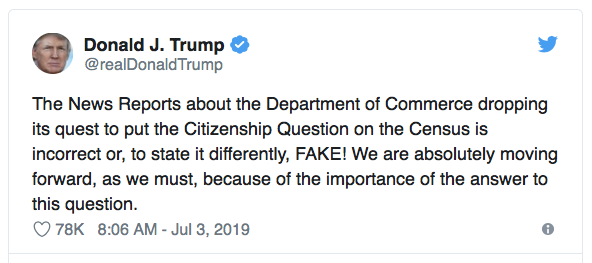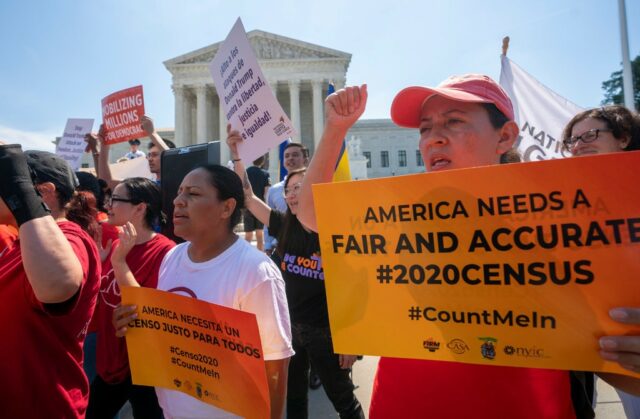 WASHINGTON — A day after pledging that the 2020 census would not ask respondents about their citizenship, Justice Department officials reversed course on Wednesday and said they were hunting for a way to restore the question on orders from President Trump.
WASHINGTON — A day after pledging that the 2020 census would not ask respondents about their citizenship, Justice Department officials reversed course on Wednesday and said they were hunting for a way to restore the question on orders from President Trump.
The contentious issue of whether next year’s all-important head count would include a citizenship question appeared to be settled — until the president began vowing on Twitter on Wednesday that the administration was “absolutely moving forward” with plans, despite logistical and legal barriers.
Mr. Trump’s comments prompted a chaotic chain of events, with senior census planners closeted in emergency meetings and Justice Department representatives summoned to a phone conference with a federal judge in Maryland.
 On Wednesday afternoon, Justice Department officials told the judge that their plan had changed in the span of 24 hours: They now believed there could be “a legally available path” to restore the question to the census, and they planned to ask the Supreme Court to help speed the resolution of lawsuits that are blocking their way.
On Wednesday afternoon, Justice Department officials told the judge that their plan had changed in the span of 24 hours: They now believed there could be “a legally available path” to restore the question to the census, and they planned to ask the Supreme Court to help speed the resolution of lawsuits that are blocking their way.
The reversal sends the future of the census — which is used to determine the distribution of congressional seats and federal dollars — back into uncertain territory.
The Supreme Court last week rejected the administration’s stated reason for adding the citizenship question as contrived. But Chief Justice John G. Roberts Jr., writing for the majority, left open the chance that the administration could offer an adequate rationale.
Faced with tight printing deadlines, administration officials said on Tuesday that it was time to abandon the effort and begin printing forms this week that do not contain the citizenship question.
Justice Department lawyers told United States District Judge George J. Hazel in a telephone conference that a decision to eliminate the question from census forms had been made “for once and for all.” Commerce Secretary Wilbur Ross, whose department oversees the Census Bureau, issued a separate statement accepting the outcome.
But a day later, an extraordinary scene played out on a conference phone call between Judge Hazel and Justice Department officials, who appeared to be blindsided by the president’s comments online.
On Wednesday afternoon, Judge Hazel opened the call by saying that Mr. Trump’s tweet had gotten his attention. “I don’t know how many federal judges have Twitter accounts, but I happen to be one of them, and I follow the president,” he said.
Joshua Gardner, a Justice Department special counsel for executive branch litigation, responded: “The tweet this morning was the first I had heard of the president’s position on this issue, just like the plaintiffs and Your Honor.”
He added: “I do not have a deeper understanding of what that means at this juncture other than what the president has tweeted. But, obviously, as you can imagine, I am doing my absolute best to figure out what’s going on.”
Mr. Gardner said that census forms would continue to be printed without the citizenship question, and that federal court rulings barring its inclusion, upheld in part by the Supreme Court, were still in force. But he added that he could not promise that would remain the case.
“This is a fluid situation and perhaps that might change,” he said, “but we’re just not there yet, and I can’t possibly predict at this juncture what exactly is going to happen.”
That seemed an apt summation of the entire census process, which has lurched from lawsuit to crisis and back since the citizenship issue arose, and seemed on the verge of being upended on Wednesday.
Looming over the latest disruptions was a July 1 deadline to begin printing 2020 census materials — a deadline that the Justice Department said could not be stretched without imperiling the schedule for the census itself.
Since Mr. Ross tacked the citizenship question onto the census in March 2018, long after other aspects of the questionnaire had been settled, the Census Bureau has been at the center of a ferocious partisan battle over the 2020 head count, its carefully tended reputation for trustworthiness and political impartiality all but shredded.
An army of critics, from cities and states to ethnic and civil-rights advocates, have argued that the question is an ill-disguised effort to skew the census’s results to the benefit of the Republican Party. That was only reinforced by the disclosure last month of a 2015 study by a Republican strategist, Thomas B. Hofeller, that explained how data from a citizenship question could be used to exclude noncitizens from the population bases used in redistricting. The newly drawn districts, he wrote, would tilt toward non-Hispanic whites and Republicans and hobble representation of Hispanics and Democrats.
Mr. Hofeller, who died last year, was the first person to urge Mr. Trump’s transition team in 2016 to add the question to the 2020 head count. Three separate federal courts — in New York, Maryland and California — have ruled that the Commerce Department violated federal procedural law and the Constitution in tacking the question onto the census. They called the department’s rationale — to improve enforcement of the Voting Rights Act — an obvious cover for some other motive.
On Wednesday, Judge Hazel ratcheted up the pressure on the administration to make up its mind, ordering the Trump administration either to confirm by Friday afternoon that it was not placing the citizenship question on the census questionnaire, or offer a schedule for continuing the Maryland lawsuit.
“Given that tomorrow is the Fourth of July and the difficulty of assembling people from all over the place, is it possible that we could do this on Monday?” Mr. Gardner asked.
“No,” the judge replied. “I’ve been told different things, and it’s becoming increasingly frustrating.”
As Judge Hazel spoke with the two sides in the Maryland case, the federal district judge overseeing the New York lawsuit ordered the Justice Department to update him on those discussions so he could decide whether to schedule a similar conference in that suit.
On Wednesday afternoon, White House officials were actively working on a way to satisfy Mr. Trump’s demand but had not yet settled on a solution.
The Justice Department ultimately acted under pressure from Mr. Trump, who had reacted angrily to the Supreme Court’s handling of the census case and insisted that his administration move forward despite the court’s ruling. Mr. Trump had blamed Mr. Ross in particular for the handling of the census question.
The suggestion that Mr. Trump was prepared to charge ahead on adding a citizenship question stirred fears among opponents of the plan who hoped the debate had been put to rest.
Attorney General Letitia James of New York, whose office oversaw the census lawsuit that led to the Supreme Court ruling last week, dismissed Mr. Trump’s statement as “another attempt to sow chaos and confusion.”
“The Supreme Court of the United States has spoken, and Trump’s own Commerce Department has spoken,” she said in a statement. “It’s time to move forward to ensure every person in the country is counted.”
Census results are used to determine House of Representatives seats and to draw political maps at all levels of government across the country. They are also used to allot federal funding for social services.
Adding the citizenship question could lead to an undercounting in areas with large numbers of immigrants, who tend to vote Democratic, potentially costing Democrats representation and government funding.
The defeat before the court came as a surprise to Mr. Trump, who for months was assured that the change was on track, and has placed Mr. Ross back in the hot seat.

Demonstrators outside the Supreme Court last week. The justices gave a limited ruling on the Trump administration effort to add a citizenship question to the 2020 census.CreditCreditJ. Scott Applewhite/Associated Press
Earlier in Mr. Trump’s term, the president soured on Mr. Ross’s handling of trade negotiations and suggested that the 81-year-old investor had lost his deal-making touch. Mr. Ross has largely avoided the president’s ire since then, but the census matter has continued to dog him.
Mr. Ross has also drawn anger from Democrats in Congress for offering shifting explanations about whom he spoke with to determine the legality of adding the citizenship question. In 2018 he acknowledged that he had discussed the issue with Stephen K. Bannon, Mr. Trump’s former political strategist, after originally claiming he talked about it only with the Justice Department.
Administration officials said that the president was not planning to fire Mr. Ross, but that the situation had renewed concerns about his performance.
By Wednesday afternoon, whatever frustration that Mr. Trump had with the commerce secretary had largely dissipated, a second administration official said, and the president was focused on finding a way to add a question to the census. Mr. Trump told aides that might mean tacking on a question after census questionnaires had been printed.
Mr. Ross’s department will soon have to clarify the status of the census publicly. The House Oversight Committee said on Wednesday that the director of the Census Bureau, Steven Dillingham, would appear before a subcommittee on July 24 to review preparations for the 2020 head count.
“It is time for the Census Bureau to move beyond all the outside political agendas and distractions and devote its full attention to preparing for the 2020 census,” Representative Jamie Raskin, a Maryland Democrat on the committee, said in a statement.
A Commerce Department spokesman did not respond to a request for comment.
Written by Michael Wines, Maggie Haberman and Alan Rappeport for the New York Times ~ July 3, 2019
